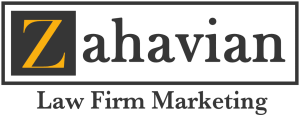Criminal defense law marketing is a highly competitive space with only so many clients available and so many ways of efficiently attracting them online. Search engines like Google, Bing and Yahoo are key to your online search presence, so knowing how to optimize your firm’s website to end up on the coveted first page of search is crucial.
In this article, we’ll go over the tactics required in a solid SEO strategy that can help propel your criminal defense practice to the first page and generate massive returns from organic search.
What is law firm SEO?
Law firm search engine optimization is the organic marketing approach to optimizing your law firm’s website to gain greater visibility and traffic in search engines through marketing strategies and methods that help you achieve ranking positions on the first page of major search engines (i.e. Google, Bing, etc.).
Why Should Criminal Defense Attorneys Use SEO?
SEO is an incredibly lucrative marketing channel for lawyers that have a winning strategy.
In a study, 96% of people looking for legal advice or information use a search engine. In another survey by Martindale Nolo, 78% of law firms said that online marketing including PPC, SEO and social media were their best performing client acquisition marketing strategies.
Because it’s such a profitable way to generate new criminal defense clients, it’s also very competitive. Having the right SEO strategy and executing on it is paramount to your success with organic search.
How to Build a Successful Criminal Defense SEO Marketing Strategy
Below, we’re going to go over the fundamentals of what will power your website to the top of the search results and have it occupying the valuable rankings that will drive more inbound traffic, inquiries and calls.
Build an Optimized Law Firm Website
Your website is the cornerstone of your online search optimization strategy. Ultimately, the goal is to drive traffic to your site, so your firm’s site is what you want to optimize for the top search rankings. There are many things that you can do to an attorney’s website to get it ranking and maintaining in top positions.
Your website’s structure is a critical component of this.
Site Architecture
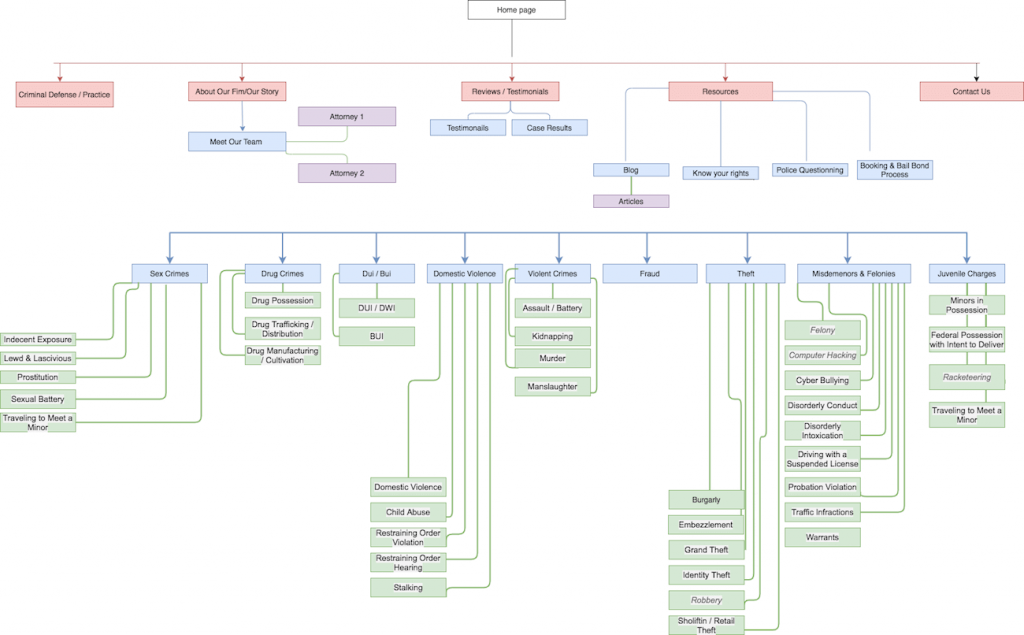
As your website’s content grows with numerous location pages, practice area service pages, blog content and more, it’s important to ensure that this is organized in a meaningful way – both for users and search engines that crawl your website, trying to understand it.
We’ve seen lots of websites where the structure wasn’t given proper thought or attention and therefore was a contributing factor to their poor rankings. After optimizing the architecture, you can see an immediate boost in search positions.
Technical SEO
Technical Search Engine Optimization deals with a number of technical factors from ensuring that your SSL and HTTPS is working properly to your site speed, schema, sitemaps, URL structure, redirects and more. Most of these components are easy to measure and diagnose if problems exist.
They are important for search engines to be able to crawl, understand and index your site. However, having one or several problems with these could make the difference between a first-page dominating website and a skeleton buried on the second page or beyond.
Publish Powerful Service Pages & Great Content
If you want to rank for a lot of valuable keywords and searches, then you have to provide excellent content and copywriting on your website. One of the main ways that Google and other search engines determine what a web page is about is by its contents.
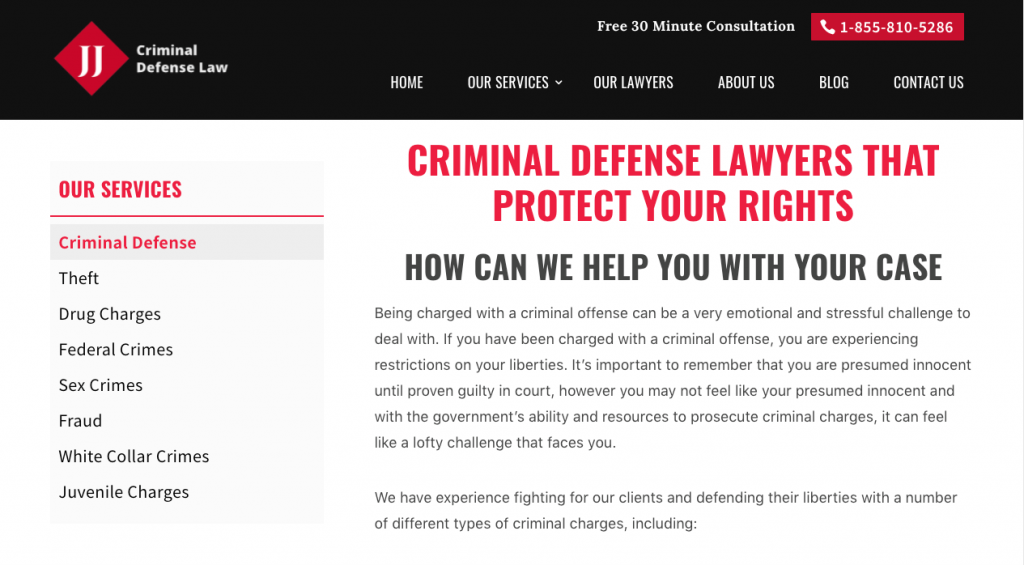
Your practice pages should aim to provide better content to site visitors than your competitors. This means more relevant information, further in-depth and in many cases longer copy. Your practice area pages are going to be key drivers to very specific criminal defense seo keywords for specific types of cases. Ensuring your content quality is top-notch and goes further than your competitors is a major component to winning first page rankings.
If your website publishes articles and blog posts, apply the same rules to it for maximum SEO impact and benefits.
Perform Perfect On-Page SEO
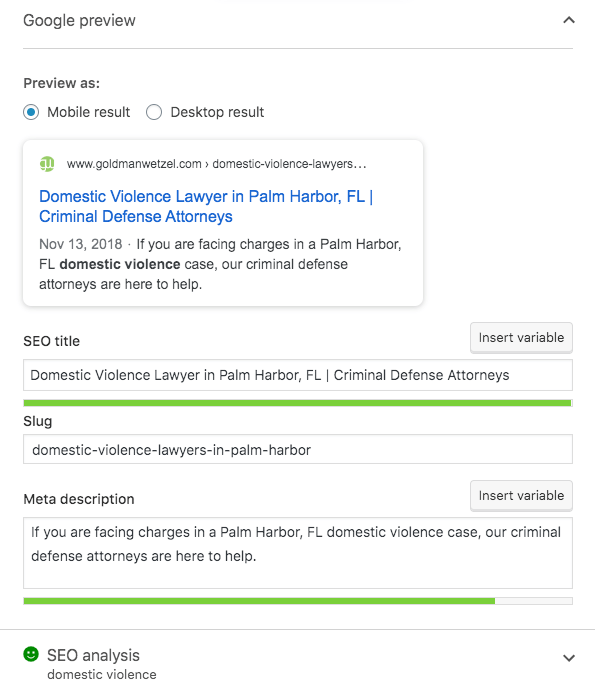
After writing a page’s content, you will want to optimize both the content and web page itself for its primary, target keywords. Doing this will require you optimizing for keywords in the following elements:
- Title tag
- Meta tag
- H1 tag
- Heading tags (h2-h6)
- Body content
- First and last paragraphs on the page
- Page URL
- Image alt tags
- Relevant on-page links (both internal and external)
This means including your keywords as well as synonyms and related terms within the page content. Your Keyword should appear in:
- The Title tag
- Your Meta Tag
- H1 Tag
- Page URL
- Several points within the page’s body content
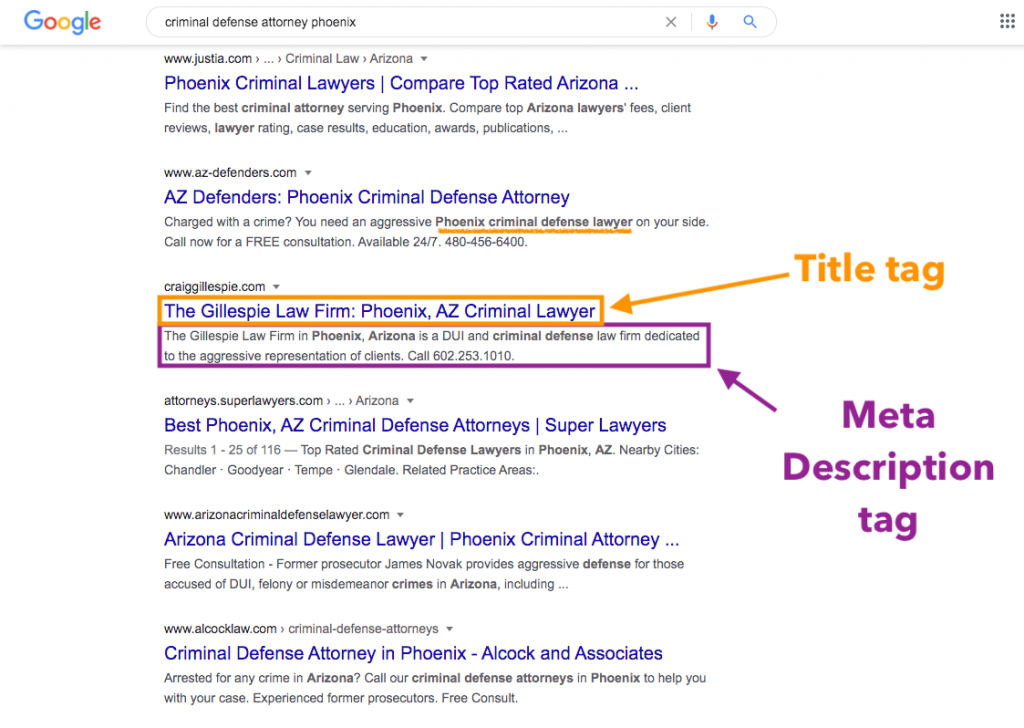
Optimizing your Title and Meta Tag are the entities that will show up in Google’s search results. These are critical components to optimize, since they will impact the Click-Through Rate (CTR) of users, which measure how many people click on your page divided by the total that saw your listing in the search results. The higher your CTR, the higher you will move up in the search rankings, since Google will notice that your page is better suited for that particular keyword.
UX: Design for Your Visitors First
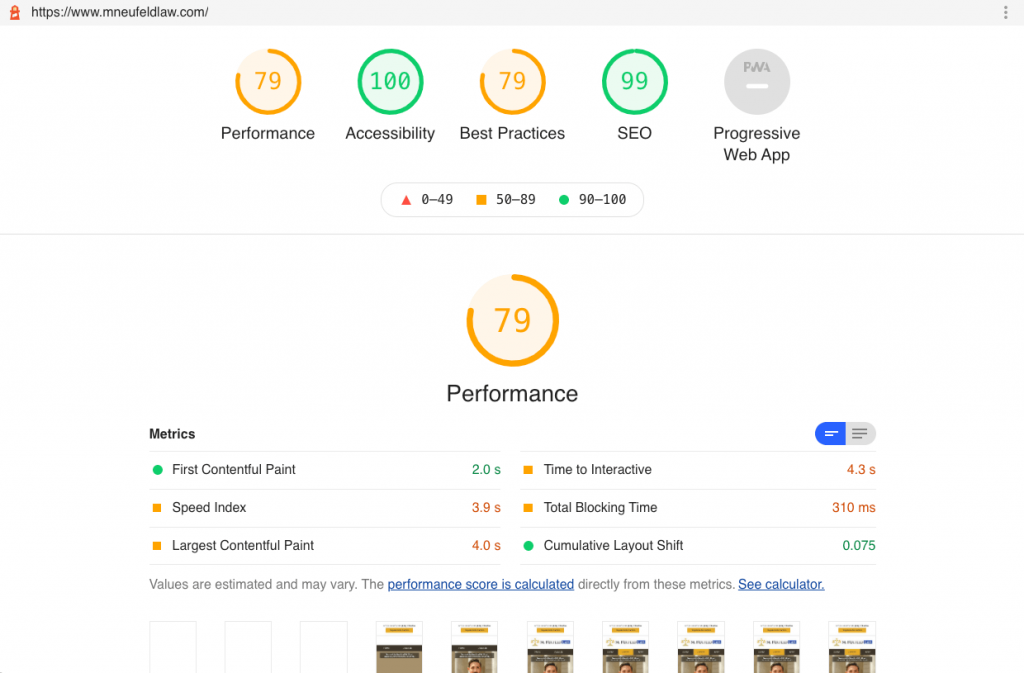
Your website’s user experience is an incredibly important consideration for your website’s organic search performance. User experience can be measured by particular UX signals, including bounce rate and dwell time among others.
There are many factors can impact user experience, such as:
- Page size and loading speed
- Easy of use of the web page
- Rich content and media (videos, custom images, visual aids such as graphics, tables and screenshots)
- Internal linking
- Engaging features or interactive components (i.e. calculators, questionnaires, quizzes, multi-step forms, gated content, lead magnets, contact forms, etc.)
Developing and providing a strong user experience will not only help your site rank but maintain positions when it delivers better UX signals over competitors. A major, new component of UX that will officially become part of Google’s search algorithm in May 2021 is Core Web Vitals.

Make this a primary, site-wide focus and then work on customizing the user experience on a page by page basis.
Establish Authority & Trust
Google has made EAT (expertise, authority and trust) a part of their algorithm, particularly in YMYL (“your money your life”) industries and categories where the information they display in the top results could have a financial or life-changing impact on their users.
Legal industry is included in the YMYL classification. This means that working on your E-A-T is critical to your firm’s success. The larger the geographical market or metropolitan area you serve, the more emphasis this will be on your SEO marketing strategy.
Expertise can be demonstrated through your website being limited to criminal defense. If you practice in several other areas of law, but criminal law makes up the bulk of your billables, then consider minimizing the footprint other practice areas occupies on your site or removing them altogether.
Focus on publishing pages and blog content focused on criminal justice and produce the most in-depth guides and information you can on topics you cover. Ensure your content isn’t thin or duplicated on other pages of your website.
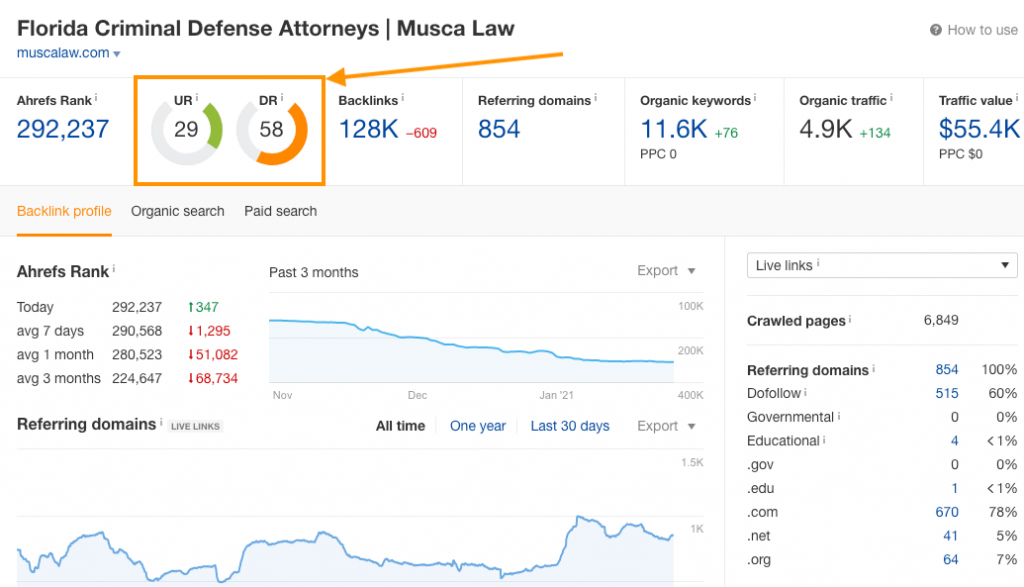
Authoritativeness is developed through your pages’ as well as your overall website’s authority. This translates primarily into the quantity and quality of backlinks your law firm acquires or earns from other websites. The more authoritative your website becomes, the easier it will rank pages for their target keywords as well as rank faster when you publish new content.
Trustworthiness is how trustworthy your firm is. This can often be confused with authority and there is some overlap, but it is distinct in major aspects. After all, just because the government has authority, doesn’t mean you always trust them, right?
Trust can be built by promoting signals that your business is legitimate through several main facets. Having lots of glowing, 5-star reviews from past clients can demonstrate trustworthiness in your business.
When linking to external sources, citing the most authoritative and trustworthy references can have an impact on your trust score.
Ensuring that users browse your website securely with a valid and signed SSL certificate is important.
Having biographical information about the firm and attorneys that is consistent with other online content is important. Linking to your privacy policy, disclosing attorney advertisements and legal information disclaimers can tell search engines that all of your site’s technical legal info is in order.
Online local directories, legal websites and business citations can corroborate your law firm’s office locations, services and basic info. Having a BBB profile with a high-rating, good consumer feedback and in good standing.
Focus on Local SEO
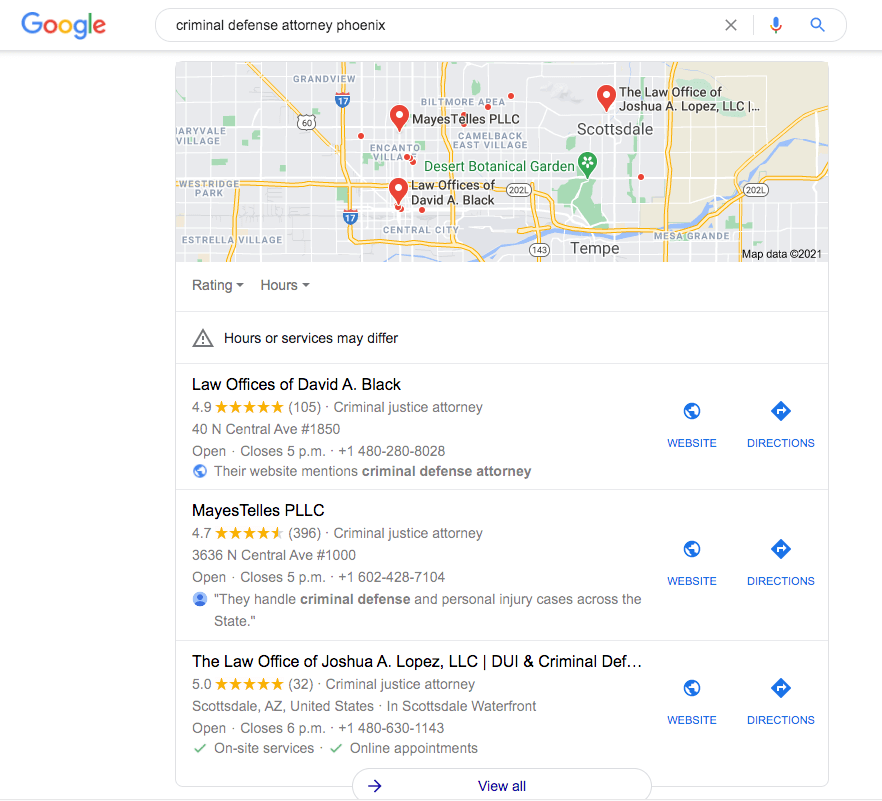
One of the most important components of your SEO strategy should be on localized rankings and ranking in the map pack’s top 3. These three positions above the organic web results can drive around 35% of the clicks to websites. Users on mobile phones will have the option to call directly from the listing as Google will display a button linked to your business’ phone number.
To get into the top local positions, you need to:
- Claim and optimize your GMB profiles (for each location)
- Standardize your NAP (Business Name, Address and Phone number) across all citation sites you’re firm’s listed
- Get listed in the top local directories, maintaining NAP consistency
- Your website and on-page SEO needs to be on-point
- Collect high quality Google reviews
- Focus on other high-visibility profiles, including Avvo, Facebook and Yelp
The ones that attorneys struggle the most with are reviews, so make sure you prioritize this at your firm and with your staff. Templates and processes involving your website and law practice management software can help systematize the workflow and make garnering more reviews just part of the firm’s weekly routine.
